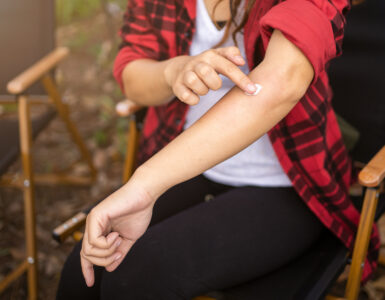Presented by Teresa C. Hunsaker, USU Extension, Weber County, Family and Consumer Science Educator
__________________________________________________________________
What you need to know about repellants
Repellents do not kill insects, but rather keep certain species away from the treated areas. Most repellents are volatile, and after they are applied to the skin or clothing, the released vapor discourages insects from approaching.
Insect repellents recommended by the Centers for Disease Control and Prevention (CDC) include those containing DEET, as well as products containing picaridin and oil of lemon eucalyptus, which have also been shown to offer long lasting protection against mosquito bites. . Picaridin repellents with seven percent active ingredient provide longer lasting protection, whereas repellents with 30 percent oil of lemon eucalyptus as the active ingredient provide protection equal to a low concentration DEET product.
Oil of lemon eucalyptus is not currently recommended for children under 3 years of age. Picaridin can be used for children of all ages. Parents and other persons should read container labels thoroughly before applying any mosquito repellents to young children. Avoid getting the repellent on children’s hands or in their eyes or mouths.
If choosing a repellent containing DEET (N,N,diethyl-m-toluamide) select a product containing the amount of DEET to match the time spent outdoors. Repellents containing 25 percent DEET protect for an average of five hours per application, while repellents containing 20 percent DEET protect for almost four hours. Repellents containing 6.65 percent DEET protect for almost two hours and repellents containing 4.75 percent DEET protect for approximately one-and-a-half hours. A higher concentration of DEET does not equate to better repelling of mosquitoes—just longer lasting. So, the higher the amount of DEET—the longer the effectiveness.
Products containing DEET are safe to use on children.
In summary—three simple steps:
First:
Check to see if the repellent contains any of the above ingredients. Many scientists believe that repellents with one or more of these three are the most effective.
Second:
Select the appropriate concentration of DEET, or other active ingredient, for you. Consider how long you’re going to be outdoors. A repellent with a higher concentration of DEET lasts longer outside, while a smaller concentration of DEET, is adequate for a short amount of time spent outdoors. Keep in mind, as the concentration of DEET, or other effective active ingredient, goes up, so does the price.
Third:
Consider your activity and select your form of repellent. If you want to apply the repellent to your clothing, a lotion will not work. An aerosol or a pump spray would be better. Maybe you don’t want to smell like repellent; choose a scented option. If you’re going to be in the sun, a repellent combined with sunscreen would be best. Keep your activity in mind when making your decision.
Final Points:
1. No insect repellent should ever be applied for prolonged periods’ of time or used in excessive amounts.
2. Insect repellents should never be applied to cuts or to broken skin.
3. The higher the concentration of DEET, the higher the number of other bugs the repellent is effective for—aedes, ticks, and a broader variety of mosquitoes.
Vanilla Mosquito Repellant
8 oz. water, 2 tsp. vanilla extract, 1 tsp lemon oil. Spray on liberally.
Can also substitute lavender oil, lemon eucalyptus oil.
Homemade Mosquito Repellent
Materials:
1/3 cup apple-cider vinegar
1/3 cup witch hazel
5 drops citronella oil
Small spray bottle
Pour all ingredients in spray bottle. Shake well each time before you spray. The vinegar smell will go away quickly…… as will the mosquitoes.
Homemade Recipe
20 drops Eucalyptus oil
20 drops Cedarwood oil
10 drops Tea Tree oil
10 drops Geranium oil
2 oz. carrier oil ( such as sweet almond or grape seed or even sunflower oil)
Mix together in a 4 oz. container. Apply to skin as needed avoiding the eye area. Keep out of reach of children. Test on a small area of skin for sensitivities . Experiment with different percentages of essential oil.
__________________________________________________________________
For more information, go to extension.usu.edu/weber or visit the USU Extension officers in Weber County at 1181 North Fairgrounds Drive in Ogden. Call (801) 399-8200















Add comment